Step-by-Step Guide to Match Your Tow Vehicle to a Horse Trailer
Plus: Why We Suggest You Buy Your Trailer First and Truck Second
Denise bought her 16-hand horse and half-ton Chevy truck several years ago. For a long time, she was happy taking rides from friends and staying mostly on home turf. One day, she decided she needed a new trailer to match her horse and truck. What kind of trailer is going to work best for her?
This is actually a very common scenario. Many of our readers ask us what type of horse trailer would be best suited to their current tow vehicle. This is certainly an important topic to consider because a poorly matched truck and trailer combination can spell disaster on the road.
We’ve written before about topics like finding your trailer’s tongue weight and how to determine if you are hauling a safe load. Now, we want to break it down even more. Here is a step-by-step guide to help you determine what type of truck and trailer combination will keep you safe on the road.
STEP 1: Buy your horse trailer first!
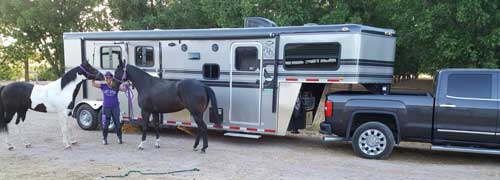 This is not always possible, but in an ideal world, everyone would buy their horse trailer first and THEN buy a tow vehicle to match.
This is not always possible, but in an ideal world, everyone would buy their horse trailer first and THEN buy a tow vehicle to match.
Think of it this way… many people will trade in their truck model every 3-5 years to get the latest and greatest their favorite brand has to offer. In contrast, a dream custom horse trailer can be designed once and then last you for twenty years or more.
Doesn’t it make sense to find your perfect trailer and then find a truck to match?
Brad Heath, owner of Double D Trailers, shared, “We recommend that you first spec out a trailer that you’d like to purchase. This way it will have everything you need for your family, horses, and hobbies. Then, find a truck that is capable of safely hauling the load.”
“We rarely build trailers to fit trucks (or any tow vehicle for that matter)….trailers are huge investment with a general life expectancy of 20-25 years. Tow vehicles are a dime-a-dozen and sitting on every corner of every town. Their life expectancy is much shorter.”
“I'd say the average person is probably making monthly payments anyway on their vehicle, so it doesn't make sense to continue making payments on something that isn't going to do its purpose….which in the case of a horse trailer…the purpose would be to tow."
“Owning horses is a great past time—so to limit the entire experience of horse hauling, trailering, etc. simply on the premise of a vehicle's capability makes absolutely no sense.”
Hopefully, you see the wisdom in this mindset. If you’re convinced, you can stop reading now and head over to the model pages to start designing a custom bumper pull horse trailer, gooseneck horse trailer, or living quarters horse trailer that fits all of your needs. If buying a new truck to match your new trailer is out of the question, then there are a few things we can suggest to help.
STEP 2: Learn about the towing capacity of your truck.
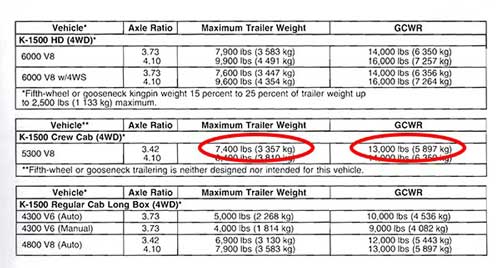
You should learn as much as you can about your current truck’s capabilities. First, check out your truck’s owner’s manual and find out how much your truck is able to haul.
Learn about the Magic G’s: Gross Vehicle Weight Rating (GVWR,) Gross Combined Vehicle Weight Rating (GCVWR,) and the Gross Axle Weight Rating (GAWR.) Your truck’s manual will also list the towing capacity for the maximum trailer weight allowed. All of these values are going to be important when you match your truck with a new horse trailer.
One common mistake people make is this: They see a very high towing capacity on their truck and assume they are good-to-go. For example, just because your truck has a GVWR of 9,000 lbs, do not assume that you are going to be able to safely haul a 6,800 lb trailer.
It’s a bit more complicated than that…
STEP 3: Find the weight and tongue weight capacity of your tow vehicle’s hitch.
If you were to walk up to a horse trailer and physically lift the front end of the trailer by the coupler, you would be holding the tongue weight of your trailer. This is also the amount of weight that is pushing down on the back of your truck.
A tongue weight that is too heavy can compromise the steering on your tow vehicle by pushing down too much on the rear of your truck and raising the front tires slightly off the road. A load that is too heavy can also cause hitch failure resulting in a serious accident.
Oftentimes, truck brands will brag about their high tow capacity vehicles, but then place a low capacity hitch on the back end. Some salesmen even purposefully mislead customers looking to buy a truck or trailer. For example, we had one client with a F-150 truck with a towing capacity of 9,000 lbs trying to haul a 6,800 lb two horse trailer.
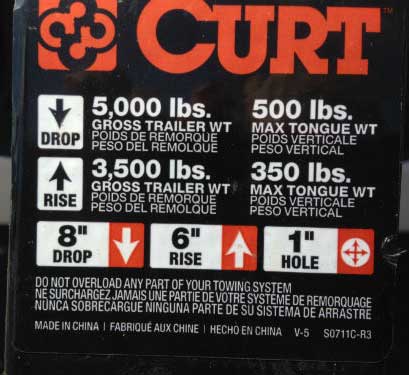
When discussing this particular client’s situation, Brad declared, “Why in the world a manufacturer would do this is beyond me!”
Even a weight distribution system, which helps a vehicle handle larger loads by distributing the weight off of the tongue and onto the other axles, would not have helped in this situation.
To solve this problem, this client needed to downgrade his trailer to a slightly narrower and shorter design. He also had to purchase a better hitch for his truck that was capable of handling 1,200 lbs. He didn’t get his dream trailer, but he did get a safe combination that could be pulled by his existing truck.
Remember that all truck brands are not created equal. For this specific situation, we discovered that his model of Ford F-150 wasn’t going to work with its existing hitch but a GMC Sierra could have handled the load.
STEP 4: Find out the weight and tongue weight of the horse trailer you’re planning to buy.
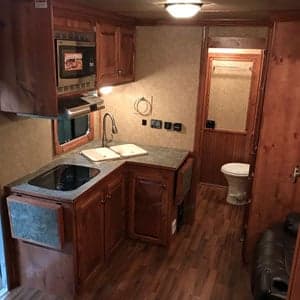
If you are purchasing a trailer second-hand, make sure you know the weight of the trailer before finalizing the sale. Weigh the horse trailer at a truck stop, self-storage lot, or roadside weigh station where you can pay around $5.00 to pull the trailer onto the scale and get an accurate measure of its weight. It is best to do this with the trailer fully loaded with horses and equipment. You can even unhitch the trailer and rest just the front support on the scale to measure the tongue weight of the trailer.
If a weigh station is not available, our tongue weight calculator will also help you find the tongue weight of your prospective trailer. The trailer manufacturer should be able to tell you the overall weight of the trailer model.
All of the trailers at Double D Trailers are custom designed to match each owner’s particular needs, so every trailer we produce is going to have slightly different weight depending on the design and features included. However, we do list a typical weight under the “Features” section for each model. Use this as a guideline to see approximately what type of trailer would work with your truck. (See photo below.)
Jus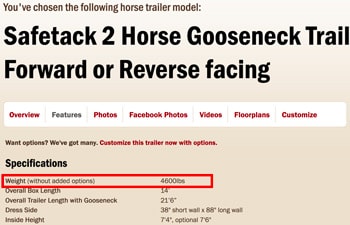
Let’s return to our initial story about Denise…
Hopefully she can look at some trailer options that would fit her horse and lifestyle first and then trade in her old Chevy truck for a newer model that would handle the load. If that isn’t possible, we’d recommend she learn all she can about the current towing capacity and hitch capacity on her truck. She needs to carefully consider the weight and tongue weight of any new trailer that she is planning to purchase. This way she can be sure she is not overloading her tow vehicle.
If she’s purchasing a custom horse trailer from Double D Trailers, we really recommend that she set aside concerns about her truck and simply build the trailer that she’ll be happy with for years to come. Then, she can figure out what types of upgrades she’ll need to consider for her tow vehicle.

